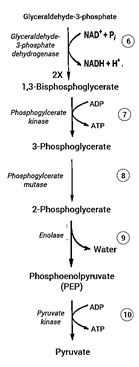Only two molecules of NADH are formed during glycolysis because:
1.The amount of energy in glucose is sufficient only to make two NADH.
2.Most of the energy of glucose is diverted to ATP during Glycolysis.
3. Most of the free energy available from the oxidation of glucose remains in pyruvate.
4.The availability of NAD+ is enough to make only two NADH.
1.The amount of energy in glucose is sufficient only to make two NADH.
2.Most of the energy of glucose is diverted to ATP during Glycolysis.
3. Most of the free energy available from the oxidation of glucose remains in pyruvate.
4.The availability of NAD+ is enough to make only two NADH.
The ʺnetʺ products of glycolysis are:
1. , , 2 pyruvate, 2 ATP, and .
2. , , 2 ATP, and 2 pyruvate
3. , 2 pyruvate, 4 ATP, and .
4.2 NADH, , 2 pyruvate, 2 ATP, and .
Glycolysis will be most adversely affected by a toxin:
1. that reacts with oxygen and reduces its availability
2. that binds to pyruvate and inactivates it
3. that closely mimics the structure of glucose but is not metabolized
4. that regenerates from NADH
Consider the latter half of glycolytic pathway given below:

In reaction 6
I. The enzyme involved is an oxidoreductase
II. Arsenate may uncouple the pathway at this stage
1. Only I is true
2. Only II is true
3. Both I and II are true
4. Both I and II are false
Consider the latter half of glycolytic pathway given below:
Regarding reaction 7:
I. Glycolysis has reached the break-even point.
II. When the cell has plenty of ATP (and little ADP), this reaction does not occur.
1. Only I is true
2. Only II is true
3. Both I and II are true
4. Both I and II are false
Refer to the schematic diagram of Krebs citric acid cycle given below:
How many of the enzymes involved in the pathway are dehydrogenases?
1. 2
2. 3
3. 4
4. 5
Refer to the given schematic diagram of Krebs cycle :
The step where substrate level phosphorylation takes place is catalyzed by the enzyme:
1. Aconitase
2. Isocitrate dehydrogenase
3. Succinyl-CoA synthetase
4. Succinate dehydrogenase
When pyruvic acid is converted to acetyl CoA, the former is:
| 1. | Oxidized | 2. | Reduced |
| 3. | Isomerized | 4. | Caboxylated |
A five carbon amino acid can be formed by which of the following intermediates of Krebs cycle?
| 1. | succinate | 2. | malate |
| 3. | citrate | 4. | α-ketoglutarate |

To unlock all the explanations of 38 chapters you need to be enrolled in MasterClass Course.

To unlock all the explanations of 38 chapters you need to be enrolled in MasterClass Course.
The number of molecules of carbon dioxide produced by three turns of the Krebs cycle would be:
| 1. | 3 | 2. | 6 |
| 3. | 12 | 4. | 18 |



